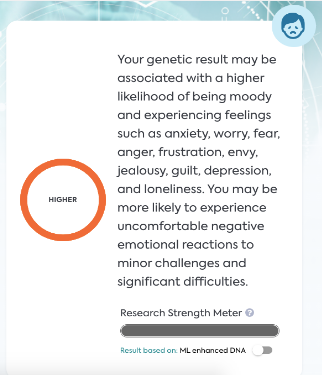What Is Neuroticism And Is It Genetic?
Aira
on
January 31, 2024
Overview
What is Neuroticism?
Neuroticism is a personality trait characterized by a tendency towards anxiety, moodiness, worry, envy, and frustration. It is one of the five prominent traits in psychology. It refers to the degree of emotional stability and impulse control. People high in neuroticism often experience emotional instability. They are more likely to interpret ordinary situations as threatening and minor frustrations as hopelessly strenuous.

Is Neuroticism a Mental Illness?
Neuroticism itself is not a mental illness. It is a personality trait that can influence our view of the world and our reactions to stress. However, high levels of neuroticism are associated with an increased risk of developing mental health disorders, such as anxiety and depression, due to the heightened sensitivity to stress and negative stimuli.
What Causes Neuroticism?
Though the exact cause of neuroticism is not fully understood, researchers believe it to be a combination of genetic, environmental, and psychological factors. Genetic predisposition plays a significant role. Life experiences, particularly those in early childhood, can shape neurotic tendencies. Psychological factors, such as coping strategies and perception of events, also contribute to developing this trait.
How to Lower Neuroticism?
Lowering neuroticism involves developing healthier coping mechanisms, emotional regulation skills, and stress management techniques. Mindfulness practices, cognitive-behavioral therapy, and regular physical activity can help manage the symptoms of neuroticism. Building strong social connections and seeking professional help when necessary are also effective strategies.
How to Treat Neuroticism?
Treating neuroticism focuses on managing its symptoms rather than the trait itself. Cognitive-behavioral therapy is effective in helping individuals understand and change their thought patterns. Mindfulness and stress reduction techniques can also be beneficial. In some cases, doctors may prescribe medication to manage specific symptoms like anxiety or depression associated with high levels of neuroticism. Regular exercise, a healthy diet, and sufficient sleep can usher in overall emotional well-being.
You May Also Like: Genetics Of Instant Gratification
Genetics Of Neuroticism
In 2017, in a study involving the Netherlands Twin Register, researchers constructed extended pedigrees of 253,015 subjects from 58,645 families, detailing the relationships among participants. The findings revealed a broad-sense heritability of neuroticism as high as 47%, providing new insights into the genetic and environmental influences on neuroticism.
A few specific genetic variants have been indicated in neuroticism:
L3MBTL2
The L3MBTL2 gene, also known as Lethal(3)malignant brain tumor-like 2, is a protein-coding gene that helps regulate chromatin structure and gene expression. It codes for a protein part of the Polycomb group (PcG) of proteins. These proteins are known for their involvement in maintaining the repressed state of genes over multiple cell generations, thereby playing a crucial role in developmental processes and cellular memory.
According to a 2016 GWAS, a variant linked to neuroticism was identified in the L3MBTL2 (rs9611519) gene that has previously been associated with schizophrenia.
CRHR1
Another 2016 GWAS identified a neuroticism-associated genetic locus on chromosome 17; SNPrs111433752. This SNP is in CRHR1, a gene coding for the corticotropin-releasing hormone receptor 1. CRHR1 is activated by corticotropin-releasing hormone leading to cortisol release, a hormone central to the stress response. CRHR1 plays a vital role in the hypothalamic–pituitary–adrenal axis, the mechanism of our bodies to manage stress, which is known to alter in severe depression. Additionally, CRHR1 is implicated in anxiety-related behaviors in animal models. It has genetic links to panic disorder in humans, highlighting its significance in stress-related conditions.
Non-Genetic Factors Affecting Neuroticism
Non-genetic factors affecting neuroticism encompass a range of environmental and personal experiences. These include:
- Childhood Experiences: Early life experiences, particularly those involving trauma or stress, can significantly influence the development of neurotic traits.
- Life Events: Major life events, such as the loss of a loved one, divorce, or job loss, can trigger or exacerbate neurotic tendencies.
- Social Environment: Relationships with family, friends, and colleagues, as well as social support systems, can impact levels of neuroticism. Isolation or poor relationship quality can increase neurotic traits.
- Culture and Societal Factors: Cultural norms and societal expectations can shape personality traits, including neuroticism. Societies with high levels of competition or stress may contribute to higher levels of neuroticism.
- Personal Coping Mechanisms and Resilience: Individual differences in coping strategies and resilience to stress can affect the development or manifestation of neuroticism.
- Mental Health Conditions: Existing mental health issues, such as anxiety or depression, can be both a cause and effect of high neuroticism.
These factors, in combination with genetic predispositions, contribute to the complexity of neuroticism as a personality trait.
Actionable Tips For Regulating Your Emotions
Regulating emotions effectively can significantly enhance well-being and interpersonal relationships. Here are some actionable tips:
- Mindfulness Practice: Engage in mindfulness techniques like meditation or deep breathing exercises. These practices help you stay present and aware, making it easier to manage overwhelming emotions.
- Identify Triggers: Recognize situations or people that trigger strong emotions. Understanding these triggers can help you prepare and respond more calmly.
- Express Yourself: Constructively communicate your feelings. Journaling or talking to a trusted person can be effective in processing emotions.
- Physical Activity: Regular exercise can help regulate mood and reduce stress, which, in turn, can make emotions more manageable.
- Healthy Lifestyle: Ensure sufficient sleep, a balanced diet, and hydration. Physical well-being greatly influences emotional regulation.
- Seek Professional Help: If emotional regulation is consistently challenging, consider therapy. Therapists can provide strategies tailored to your specific needs.
- Cognitive Restructuring: Learn to challenge and change negative thought patterns exacerbating emotional responses.
- Pause and Reflect: Before reacting, take a moment to pause. This brief period can provide clarity and prevent impulsive responses.
- Develop Empathy: Understanding other perspectives can help manage our emotions in social situations.
- Practice Self-Compassion: Be kind to yourself, especially during emotional turmoil. Self-compassion leads to healthier ways of dealing with difficult emotions.
LifeDNA’s Personality & Cognition Report

The LifeDNA Personality Report offers intriguing insights into how your genetics might influence your behavior, emotions, and social interactions. Based on genetic markers associated with personality traits like introversion, extroversion, and emotional resilience, the report provides a detailed analysis to help you understand yourself better. Knowing your genetic predispositions can guide personal development, optimize relationships, and aid in career satisfaction.
Also Read: A Full Walkthrough Of the LifeDNA Personality & Cognition Report
References
- https://www.thomas.co/resources/type/hr-guides/what-are-big-5-personality-traits
- https://www.ncbi.nlm.nih.gov/pmc/articles/PMC5752751/
- https://www.nature.com/articles/ng.3736
- https://www.nature.com/articles/mp201649
- https://www.ncbi.nlm.nih.gov/pmc/articles/PMC7596875/
- https://pubmed.ncbi.nlm.nih.gov/27157024/
*Understanding your genetics can offer valuable insights into your well-being, but it is not deterministic. Your traits can be influenced by the complex interplay involving nature, lifestyle, family history, and others.
Our reports and suggestions do not diagnose or treat any health conditions or provide any medical advice. Consult with a healthcare professional before making any major lifestyle changes or if you have any other concerns about your results.













